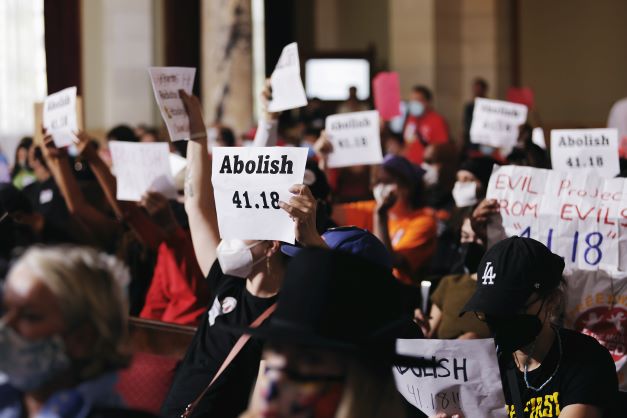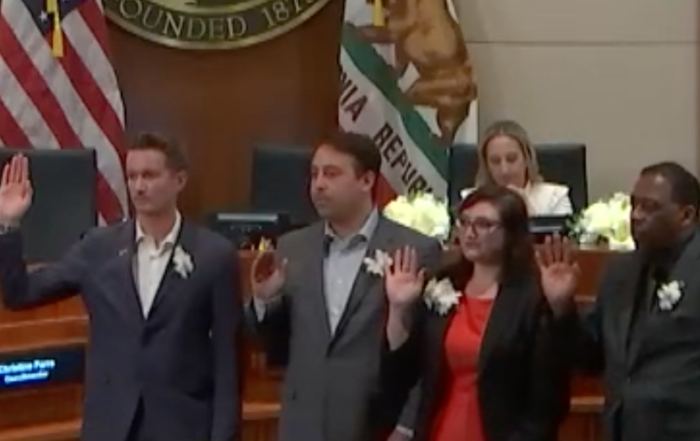In July of 2021, the Los Angeles City Council passed an Ordinance, 41.18, stating, “No person shall obstruct a street, sidewalk, or other public right-of-way,” which was directly aimed at those experiencing homelessness whose places to stay overnight and generally exist are limited. The ordinance, which replaced an earlier attempt that was deemed unconstitutional*, was passed almost unanimously.
This week, the L.A. City Council voted to expand the ordinance, “to specify the particular times and locations where it shall be unlawful for a person to sit, lie, or sleep, or to store, use, maintain, or place personal property in the public right-of-way,” including a requirement that no homeless persons may remain within 500 feet of a “sensitive area,” as defined as “School, Day Care Center, Public Park, or Public Library.” Expansion of the ordinance seems to have become commonplace. The tenets of the latest iteration of 41.18 proposed to make just about every movement – including simply freezing in place – a crime for those experiencing homelessness, giving the unhoused very few options of where to exist in the city, other than to keep moving nomadically throughout your neighborhood and those of most Angelenos you know. This replacement ordinance also passed overwhelmingly, 11-3. Councilmembers Mike Bonin, Marqueece Harris-Dawson, and Nithya Raman voted against it.
My friend Melissa Phillips, a photographer and journalist, attended the debate in council chambers on Tuesday along with hundreds of other activists advocating against the substitute ordinance to further criminalize those experiencing homelessness. I asked Melissa to sit down with me and let me know what she witnessed as the council proceeded with debate.
Todd Flora (TF): Melissa, thank you for sitting down with me. What brought you down to council chambers on Tuesday?
Melissa Phillips (MP): I have been documenting unhoused communities, working closely with local housing advocates for the last 2 and a half years in Los Angeles. During that time, I observed a lot of suffering. I should probably mention that my brother has experienced houselessness himself and so these issues have been really important to me. And the idea of having a safe, permanent home is something that’s incredibly important to me, something I’m passionate about, and therefore, I’ve been passionate about working in this space of houselessness and working with these organizations. It’s something that’s really personal to me, and honestly, something I find unbearable – the thought of people not having a safe, permanent place to call home. So, when 41.18 was passed last year, I was made aware very quickly just how devastating that would be for that community.
I do understand that local government has a responsibility to balance people’s personal interests with public safety, but I just think they are really approaching this from a very devastating point of view. I’m usually there to observe, but yesterday, I attended myself, alongside other activists, because I think it’s really important that the city council hears people’s concerns and is working together with the unhoused community and local activists to actually address the root of the problem. Because 41.18 is a form of criminalization of unhoused people. There’s nothing about 41.18 that solves houselessness. It’s just there to remove the visibility of houselessness.
TF: Do you think the council and others – the LAPD – are being punitive because they simply don’t have enough solutions to really help these people? And so they go with – like you said – clearing the visibility of the problem rather than really solving the problem?
MP: There’s certainly a lack of political will and I think there’s a lack of interest in addressing the root of houselessness and addressing the problem with long-term solutions. When I’ve spoken to people who are very much in favor of 41.18, they do believe it’s a safety issue. They see encampments; they fear things like violence, drug abuse, potentially drug overdoses, and garbage. They’re concerned about their children having to go to school and walk passed a dead body. And so they want 41.18 to move these encampments out of their neighborhoods. But it’s really concerning to me when people aren’t concerned that someone has died – for reasons that could be preventable – they’re more concerned about their children having to see it. To me, that’s addressing the symptoms of the problem as opposed to addressing the root of the problem. People should be outraged these people have died. They should be looking into how we can actually address what caused these deaths as opposed to just trying to push it out of sight. And so I think there is a lot of pressure on certain council members to act quickly, and as a result of acting quickly, it’s not going to solve the problem. It’s just going to kick the can down the road.
TF: To me, I hear these supporters of 41.18 sort of convince themselves that they’re helping the homeless; they say things like, “there’s nothing moral about leaving these people on the street,” but they aren’t actually getting them off the street. But they’ve convinced themselves that they’re actually helping these people by doing this. Wouldn’t you say?
MP: I 100 percent agree with that. I think some of that can come down to political talking points in order to get people to back these “solutions” that aren’t really solutions. I hear it coming out of some of the council people’s offices, and then I hear it repeated back from local constituents – the points you just made. You know, advocates can be painted with a very polarizing brush. They’re considered to be extremists, that they’re there to keep people on the street. And that’s not the case at all. No one wants to see these people on the street. No one wants to be doing this work in 20 years. Everyone would love to be working toward a solution that’s a success and to actually have the work make an impact. The whole disagreement is about how to address the problem. So everyone’s in agreement there’s a problem; everyone can agree we want to solve houselessness; everyone can agree we want there to be no more encampments. But it’s how we do that, and who are we serving with these measures?
TF: Let’s return our attention to what you actually witnessed on Tuesday. Talk to me a little bit about the atmosphere inside council chambers prior to this item coming up on the agenda. You’ve described a little bit about the people who were in the room. How were they organized? The L.A. Times quoted people as saying they were there just to shut down this debate. How would you characterize that assessment? And was it an upbeat feel? Was it strictly outrage?
MP: I think going into it there was a lot of concern in the room. There were a lot of advocates and activists there. There were also a lot of people from unhoused communities who were there to speak. And I think there was just a great deal of concern about the city council potentially making a decision that would affect thousands of unhoused Angelenos negatively. So, that was kind of the mood going into it. I wasn’t aware of any intention to shut down any vote –
TF: Sorry, but were the activists allowing the council to proceed with business, or was it just too loud in there to move any discussion forward?
MP: What happened was that everyone filed in, and waited for the city council session to begin. Once it began, it began with a brief statement and then it started with public comment. There were a lot of people who signed up for public comment, and one of the first things that became frustrating for some of the people who were there is that – I have no way of verifying this – but I heard people were very concerned that the city council was cherry picking people on that list [to speak]. It’s supposed to go chronologically of who signed up to speak, but there were people who were there claiming they were being skipped over; that they came to the city council with people who signed up after them and they were getting skipped over. People signed up to speak and were not getting called on.
TF: How long was public comment allowed to proceed before the council president shut things down and cleared the room?
MP: I’m not sure… I know the session started late, and we were there until around noon. But I will say that during public comment there were a number of unhoused people who spoke and also a number of activists who spoke. Some people were making some really excellent points and voicing some really important concerns. One of the other points of frustration for some speakers was the city council members weren’t even looking up to listen to the speakers. People were on their phones, they were just looking at paperwork; at one point, one of the activists was demanding that people look at her because she was so frustrated. You know, she’s out on the streets every day helping people – this is what she was explaining – that she’s out on the streets every day doing that work, and she took time off from her job to be there and to speak, and so she demanded that people look at her.
I was starting to take note of who was paying attention, and I know that [Councilmember Joe] Buscaino – I ended up taking a photo of him because I didn’t notice him look up once during public comment. It was pretty noticeable to me. Some people [council members] would occasionally take a moment to look up at people, but for the most part, it didn’t feel like people were being listened to. And that, I think, was additional fuel on the fire. They had shown up, they had made it a point to speak, and the city council, it appeared, as if they weren’t even listening.
TF: Once the room was cleared for a recess, were you and others allowed back to witness the rest of the debate?
MP: After the morning session was over, I had to get back to work. So I wasn’t really able to follow up with what happened. I know public comment was able to conclude and [Councilman Mike] Bonin gave a really insightful comment. He had a presentation there, it was very much in line with a lot of the information I’ve received about how devastating the expansion would be. He talked about the concerns of the unhoused community, he talked about the concerns of the advocates. When Buscaino got up to speak after that, that’s when people erupted, shouting concerns that they wanted to shut it down. I don’t know if the fact that Buscaino seemingly wasn’t listening for the duration of public comment and then got up to speak about it was potentially a turning point. That ignited this flame and caused the activists to want to shut things down. But it certainly didn’t feel like a fair discussion. It felt like they were doing their due diligence in order to hold a vote. Everyone had already made up their mind.
The police were there. Some of the advocates were expecting that we would be escorted out, but in the end, that didn’t happen. The police just let people voice their concerns there in the chamber. There was just a lot of pent-up frustration and fear over what would happen next.
TF: With the couple of minutes we have left, did you confer at all with the advocates over what, in fact, happens next?
MP: The fight continues. As far as actual next steps, I don’t have specifics but the fight continues. As you know, the city council did go back in the afternoon to vote yes in the end, with three voting no. You know, one of the biggest issues that makes this important timing-wise, is that so many Project Roomkey operations are shutting down. The city has not found housing for these people. They will end up back on the street. And at the same time, the city council is voting to expand 41.18. It makes no sense.
TF: It sounds like we’re just going to be pushing people around, and the enforcement itself will require such a mobilization of law enforcement that it could really get scary?
MP: And this really just shouldn’t be a criminalization issue. No one should be criminalized for being poor; for being unhoused; having mental health issues; or having drug addiction issues. You know, these are not issues of criminalization. But, sadly, that’s what we’re doing. But the fight’s going to continue. We have elections coming up in the fall. A lot of progressive candidates have been making headway. Some have won in the primary. And I think this issue is partly what’s fueling it, because it’s incredibly cruel to take people in during the pandemic, put them in Project Roomkey, kick them out, and then pass an ordinance that says they can’t be on the street. And, at the same time, there’s not enough shelter; there are not enough resources; the solutions just aren’t there. And the only solution to ending houselessness is a home; is a house.
TF: Perfect. Well, I really appreciate you being down there. I really appreciate you being able to report to me what you saw, and we’ll continue to follow along as this progresses or regresses, however you want to look at it. Thank you so much, Melissa.
Photograph by Melissa Phillips
* Jones v. City of Los Angeles – 444 F.3d 1118 (9th Cir. 2006) (via LexixNexis)
RULE: Just as the Eighth Amendment prohibits the infliction of criminal punishment on an individual for being a drug addict, or for involuntary public drunkenness that is an unavoidable consequence of being a chronic alcoholic without a home, the Eighth Amendment prohibits a city from punishing involuntary sitting, lying, or sleeping on public sidewalks that is an unavoidable consequence of being human and homeless without shelter in the city.
Stay informed. Sign up for The Westside Voice Newsletter
By clicking submit, you agree to share your email address with Westside Voice. We do not sell or share your information with anyone.








